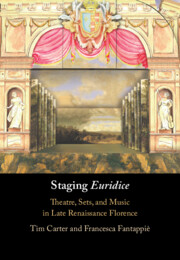Book contents
- Staging Euridice
- Staging Euridice
- Copyright page
- Contents
- Illustrations
- Tables
- Preface
- Sources, Transcriptions, and Translations
- Money, Accounts, Measurements, Dates, and Time
- Abbreviations
- 1 Euridice in Context
- 2 Staging and Sets
- 3 Euridice in Performance
- 4 Conclusions and Consequences
- Appendix I: Documents
- Works Cited
- Index
1 - Euridice in Context
Published online by Cambridge University Press: 11 November 2021
- Staging Euridice
- Staging Euridice
- Copyright page
- Contents
- Illustrations
- Tables
- Preface
- Sources, Transcriptions, and Translations
- Money, Accounts, Measurements, Dates, and Time
- Abbreviations
- 1 Euridice in Context
- 2 Staging and Sets
- 3 Euridice in Performance
- 4 Conclusions and Consequences
- Appendix I: Documents
- Works Cited
- Index
Summary
The marriage of Maria de’ Medici and King Henri IV in October 1600 was a triumph of Florentine diplomacy celebrated by a range of entertainments. Some were provided by the Medici, and others by young patricians such as Jacopo Corsi to gain their favor. They also used the occasion to display a novel form of musical theatre recently developed in Florence: opera. Euridice was performed on a temporary stage before a small audience in the Medici’s private residence (the Palazzo Pitti), and Il rapimento di Cefalo in the much larger Teatro degli Uffizi. Not all went well: members of the old guard, including the theatre designer Bernardo Buontalenti and the Florentine intellectual Giovanni de’ Bardi were highly critical. But the choice to have dramas presented entirely in music was both artistic and political. It also forced painters, poets, and musicians to create innovative solutions to typical theatrical problems. The archival documents presented here include inventories, financial accounts, and memoranda that pose important questions about the mechanisms for creating, administering, and funding such events, moving far beyond conventional notions of princely extravagance.
Keywords
- Type
- Chapter
- Information
- Staging 'Euridice'Theatre, Sets, and Music in Late Renaissance Florence, pp. 1 - 63Publisher: Cambridge University PressPrint publication year: 2021

